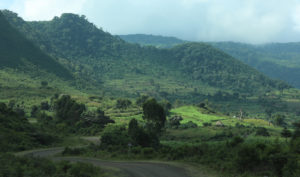Hidden from the main road surrounded by breathtaking mountains that continue for miles is Balt, a kebele, or village, located 20-minutes on foot from the paved road. Like most of the kebeles, houses in Balt are dispersed and consist of a few concrete structures with zinc roofs, and mostly round thatched huts that dot the hilly landscape.

Kwesi Beti and his wife live here with their four children. Their lives are typical of this community—he farms the land, and what his family doesn’t eat or use, is sold at the market in Maji, 90 minutes away on foot. His children attend a primary school located at the edge of the kebele by the road.
Kwesi recently purchased a solar home system from the Maji Development Coalition (MDC). It provides enough power to charge his cell phone, a radio, and two light bulbs in his home.
“Now I don’t have to walk more than an hour to Maji to charge my phone,” Kwesi said through a translator. “I also don’t have to buy batteries for flashlights anymore, and I’m saving money.”
About 21 Balt families have purchased solar home systems and is evident from the roof-top solar panels sitting on thatched roofs. NRECA International is working with MDC to establish an electric cooperative in the area to help grow and expand the availability of reliable and affordable electricity to communities like Balt.
Because Kwesi has spent his 36 years in this remote and isolated area, the path toward a better life with the availability of electricity isn’t clear yet. He is currently focused on paying off debt and saving money.
But like any parent, Kwesi knows what he wants for his children.
“I do not wish for them to live a simple farmer’s life, but to be a lot more prosperous.”
Learn more about our work with MDC to bring an electricity to Maji.